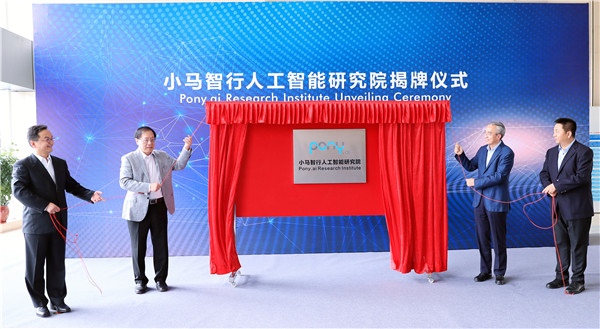Having begun testing of China’s first autonomous ride-sharing fleet on city streets months ago, Pony.ai, a world leading autonomous vehicle company, officially established an AI research institute in Nansha on May 11th.
The launching ceremony of Pony.ai's research inatitute in Nansha[Photo provided to Newsgd.com]
The research institute will be dedicated to self-driving technology and AI-related research while gathering top academics worldwide. It is expected to lead the country in AI technology, boost the development of innovative industries and eventually, contribute to the development of the Guangdong-Hong Kong-Macao Bay Area.
During the launch ceremony, Cai Chaolin, standing member of the CPC Guangzhou Committee and Party Chief of Nansha district, awarded Yao Qizhi the employment certificate as Nansha’s consultant for artificial intelligence. Yao is a member of the Chinese Academy of Sciences and the only Chinese National to have won the Turing Award, the most prestigious award for computing.
According to Pony.ai, Yao Qizhi has been appointed as the dean of the research institute and will work with a batch of top scientists in the field of computing and information technology.
For example, Li Li, IEEE and ACM Fellow and former director of Uber’s machine learning division, will be the deputy dean of the institute while Yang Xiaokang, deputy dean of School of Electronics, Information and Electrical Engineering, Shanghai Jiao Tong University and Xu Min, assistant research professor of the School of Computer Science, Carnegie Mellon University, will be consultants.

Cai Chaolin awarded Yao Qizhi the employment certificate as Nansha’s consultant for artificial intelligence.[Photo provided to Newsgd.com]
To foster the AI industry, Nansha has released a batch of policies, including rules for the road testing of autonomous vehicles and a three-year development plan for the AI industry, offering guidelines on applying AI to various sectors, such as transportation, social security and medical treatment. In addition, it has put forward a series of advantageous policies in support of AI enterprises and research teams.
With this support, the AI industry has benefited from increasing opportunities and rapid development in Nansha. Enterprises including Pony.ai and ISCAS have started conducting research in the district.
Peng Jun, CEO of Pony.ai said the company was introduced to Nansha in October 2017 and conducted the first road test just two months later. Thus far, Pony.ai has been organizing road tests 24/7 in Nansha’s downtown area and gained the chance to cooperate with GAC, a Fortune 500 company and a leading Guangdong-based auto manufacturer.
In the future, Pony.ai will work closely with the Nansha district government, and develop an autonomous ride-sharing fleet to serve the public in the Pearl Bay Area. It is hoped that this plan could be realized in 2 to 3 years.
Reported by Jasmine Yin
Edited by Wing Zhang, Simon Haywood
Correspondent Lin Zhengshan, Zhangyu
Photo by Zhou Zhiqun

















